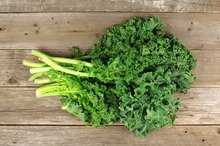What does fact checked mean?
At Healthfully, we strive to deliver objective content that is accurate and up-to-date. Our team periodically reviews articles in order to ensure content quality. The sources cited below consist of evidence from peer-reviewed journals, prominent medical organizations, academic associations, and government data.
The information contained on this site is for informational purposes only, and should not be used as a substitute for the advice of a professional health care provider. Please check with the appropriate physician regarding health questions and concerns. Although we strive to deliver accurate and up-to-date information, no guarantee to that effect is made.
Multivitamins are combinations of vitamins generally found in food, to help meet your nutritional needs.. According to Medline Plus, a service of the U.S. National Library of Medicine, your body needs 13 vitamins to grow and develop normally 1. These are vitamins A, C, D, E, K and eight B vitamins, or B complex. You generally get enough vitamins through what you eat, but may need to take a multivitamin if your diet is lacking in certain foods 2.
Vitamin A
Vitamin A is an antioxidant whose primary role is to protect cells from the damage of free radicals, unstable, unpaired molecules that can damage cells and DNA as they voraciously seek to pair up. Vitamin A also plays an important role in proper vision, bone growth, reproduction, cell function and immune system.
Vitamin C
What Are the Benefits of Vitamin B-1 or Thiamine?
Learn More
Vitamin C, or ascorbic acid, is important to promoting healthy bones, skin and connective tissues. It also promotes healing because it is needed in the formation of collagen, a protein your tissues and skin are made of. It is also needed to absorb iron, a mineral needed for the formation of healthy red blood cells.
- Vitamin C, or ascorbic acid, is important to promoting healthy bones, skin and connective tissues.
- It is also needed to absorb iron, a mineral needed for the formation of healthy red blood cells.
Vitamin D
Vitamin D helps your body absorb calcium, a mineral needed for proper bone growth. You can get vitamin D through your diet, but your body also makes vitamin D as a result of sun exposure. When UV rays penetrate your skin, the liver is trigger to synthesize vitamin D. Vitamin D also helps promote proper nerve, muscle and immune system function.
Vitamin E
Can Poor Diet Cause Easy Bruising?
Learn More
Vitamin E helps prevent the destruction of vitamins A and C and also acts as an antioxidant together with vitamins A and and C to prevent cellular damage. It also plays a role in immune function and metabolism.
Vitamin K
Vitamin K helps your body make proteins needed for healthy bones and tissues and makes proteins for blood clotting. For this reason, a lack of vitamin K can cause excess bleeding. Newborns have very little vitamin K and receive a vitamin K shot shortly after birth.
B Vitamins
The B vitamins are thiamine, riboflavin, niacin, pantothenic acid, pyridoxine, biotin, cobalamin and folic acid. They work together to help your body produce energy from food. They also help make red blood cells, which carry oxygen and nutrients throughout your body. B vitamins are also needed for proper DNA and RNA formation.
- The B vitamins are thiamine, riboflavin, niacin, pantothenic acid, pyridoxine, biotin, cobalamin and folic acid.
- They also help make red blood cells, which carry oxygen and nutrients throughout your body.
Related Articles
References
- MedlinePlus - A Service of the U.S. National Library of Medicine: Vitamins
- Drugs.com: Multivitamin
- Albahrani AA, Greaves RF. Fat-Soluble Vitamins: Clinical Indications and Current Challenges for Chromatographic Measurement. Clin Biochem Rev. 2016;37(1):27–47.
- Selhub J, Paul L. Folic acid fortification: why not vitamin B12 also? Biofactors. 2011;37(4):269-71. doi:10.1002/biof.173
- Ebben M, Lequerica A, Spielman A. Effects of pyridoxine on dreaming: a preliminary study. Percept Mot Skills. 2002;94(1):135-40. doi:10.2466/pms.2002.94.1.135
- U.S. National Library of Medicine. ToxNet: Nicotinic acid. Updated November 28, 2018.
- Chambial S, Dwivedi S, Shukla KK, John PJ, Sharma P. Vitamin C in disease prevention and cure: an overview. Indian J Clin Biochem. 2013;28(4):314–328. doi:10.1007/s12291-013-0375-3
- Dietary Reference Intakes for Vitamin C, Vitamin E, Selenium, and Carotenoids. Washington (DC): National Academies Press; 2000.
- Golan D, Staun-ram E, Glass-marmor L, et al. The influence of vitamin D supplementation on melatonin status in patients with multiple sclerosis. Brain Behav Immun. 2013;32:180-5. doi:10.1016/j.bbi.2013.04.010
- Mason C, de Dieu Tapsoba J, Duggan C, Wang CY, Korde L, McTiernan A. Repletion of vitamin D associated with deterioration of sleep quality among postmenopausal women. Prev Med. 2016;93:166–170. doi:10.1016/j.ypmed.2016.09.035
- Rizvi S, Raza ST, Ahmed F, Ahmad A, Abbas S, Mahdi F. The role of vitamin E in human health and some diseases. Sultan Qaboos Univ Med J. 2014;14(2):e157–e165.
- DiNicolantonio JJ, Bhutani J, O'Keefe JH. The health benefits of vitamin K. Open Heart. 2015;2(1):e000300. doi:10.1136/openhrt-2015-000300
- NIH Osteoporosis and Related Bone Diseases National Resource Center. Calcium and Vitamin D: Important at Every Age. Updated October 2018.
- Ross AC. Dietary Reference Intakes for Calcium and Vitamin D. Washington, DC: National Academies Press; 2011.
- Straub DA. Calcium supplementation in clinical practice: a review of forms, doses, and indications. Nutr Clin Pract. 2007;22(3):286-96. doi:10.1177/0115426507022003286
- U.S. National Library of Medicine. ToxNet: Calcium Compounds. Updated January 29, 2000.
- Gröber U, Schmidt J, Kisters K. Magnesium in Prevention and Therapy. Nutrients. 2015;7(9):8199–8226. doi:10.3390/nu7095388
- U.S. National Library of Medicine. DailyMed: Milk of Magnesia. Updated October 19, 2018.
- Kantor ED, Rehm CD, Du M, White E, Giovannucci EL. Trends in Dietary Supplement Use Among US Adults From 1999-2012. JAMA. 2016;316(14):1464–1474. doi:10.1001/jama.2016.14403
Writer Bio
Janet Renee is a clinical dietitian with a special interest in weight management, sports dietetics, medical nutrition therapy and diet trends. She earned her Master of Science in nutrition from the University of Chicago and has contributed to health and wellness magazines, including Prevention, Self, Shape and Cooking Light.









